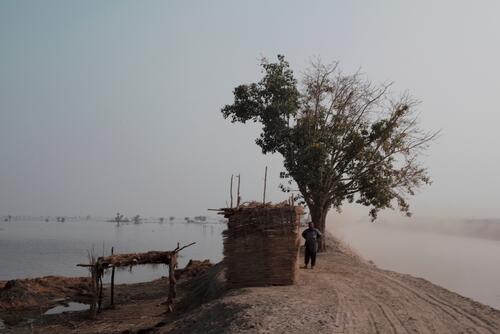Flood waters have largely receded and people have begun to return to what remains of their homes.
Since the beginning of the floods, MSF has:
- conducted 56,991 consultations through 5 hospitals, 7 mobile clinics and 6 Diarrhoea Treatment Centres (DTC)
- treated more than 3,634 malnourished children
- distributed 1,250,400 litres of clean water per day and built 714 latrines
- distributed a total of 58,270 relief item kits and 14,538 tents
- 125 international staff are working alongside nearly 1,200 Pakistani staff in MSF’s existing and flood response programmes in Pakistan.
- MSF’s current expenditure for the emergency response to the floods has reached approximately 7 million
- MSF’s 2010 budget for normal operations in Pakistan is approximately 10,9 million
End of emergency response activities in Khyber Pakhtunkhwa, FATA and Punjab
Now that the floodwaters have receded and the emergency phase of the response has been declared over, MSF has closed its emergency response activities in Punjab and Khyber Pakhtunkhwa provinces.
The flood waters in the regions have largely receded and people have begun to return to what remains of their homes. In Sindh and Balochistan provinces, MSF teams continue to assist displaced people with not only immediate needs such as health care and clean water but also transitional shelters until their situation is stabilised.
Medical activities
Medical teams continue to run mobile clinic activities across Sindh province. In southern Sindh (Jamshoro, Dadu, Johi and Sehwan districts), the number of cases of diarrhoea and skin diseases, which were the main causes of morbidity at the beginning of the floods, have decreased significantly. However, the teams have been seeing an increase in the number of patients suffering from general body pain fatigue and now represent about 45 percent of the consultations.
These symptoms are likely the result of the excessive stress that came with losing homes, poor access to food and safe water, and generally unhygienic living conditions in camps and shelters. Therefore, the team has started mental health activities, individual and group counseling, for almost 600 patients. In the district of Johi, more than 1,000 medical consultations have been conducted since the team started mobile clinic activities two weeks ago.
MSF projects
In Khyber Pakhtunkhwa, emergency response projects in Nowshera and Charsadda districts closed mid-October. MSF had provided emergency water supply, relief item packages and tent distributions, and mobile clinics since July 29.
Projects that were running before the floods, in Swat, Malakand, Lower Dir, Peshawar, Hangu districts and Kurram agency, remain open. They focus mainly on secondary healthcare - hospital emergency rooms, emergency surgery and emergency obstetrics--in conflict-affected areas.
In Punjab, MSF closed an emergency response project in Muzaffargarh district, in the Tehsil Quarter Hospital of Kot Addu, which had been open since mid-August. MSF ran a diarrhoea treatment centre (DTC) and treated 4,400 patients over the last 10 weeks. As the medical situation improved and the epidemiological situation held steady, MSF closed the DTC and handed over the medical wards to the Ministry of Health.
MSF also assessed the nutrition situation in and around Kot Addu before closing the activities. A nutrition screening was organized in Kot Addu town and nearby villages for more than 2,000. About 50 of them were treated for malnutrition.
Over the past month, 5,000 families in Punjab received relief item packages, and 2,300 families received tents. Water and sanitation teams also dug wells in three surrounding villages so flood affected families would have better access to water.
Since 1988, MSF has been providing medical assistance to Pakistani nationals and Afghan refugees suffering from the effects of armed conflicts, poor access to health care, and natural disasters in Khyber Pakhtunkhwa, Balochistan, Punjab, and Sindh provinces, as well as the Federally Administered Tribal Areas and Kashmir.
MSF does not accept funding from any government for its work in Pakistan and chooses to rely solely on private donations.




